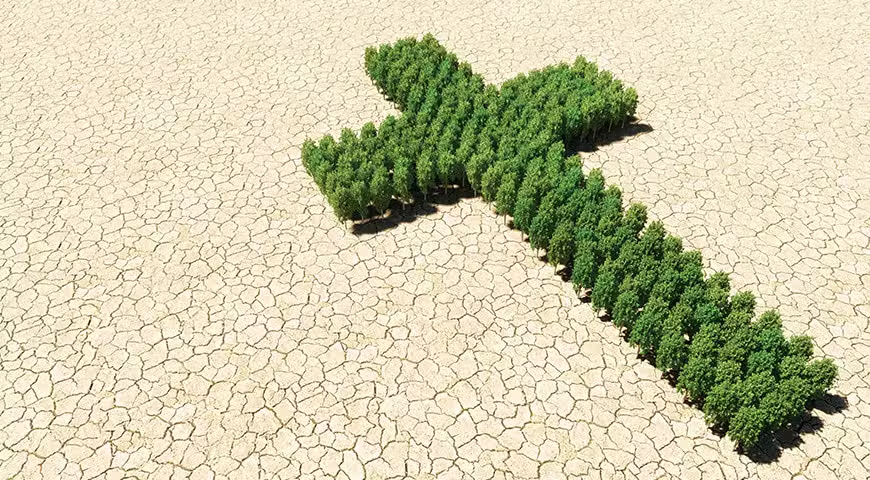I stood quietly in the back of the sanctuary one Easter Sunday, surrounded by raised hands and lifted voices—but feeling alone. Though I had a reverence for the congregation’s energy that filled the sanctuary, I also found myself wondering about the origin of this rising passion.
The preacher’s fiery sermon was focused on how Christ’s resurrection validated the truth of his own beliefs. The Resurrection, for him, was the stamp of approval that Christians had it figured out. I couldn’t help but wonder if the emotion bursting forth around me was related more to the thrill of certainty than it was about the transforming power of the Resurrection.
Was I off base? Maybe. Was I cynical? Probably. At that time, I was beginning to confront the spiritual doubts I had carried, sometimes overwhelmed by bitterness and confusion. But I was also beginning to place a finger on something that has plagued Christianity: our tendency to commodify faith; for our Western values to pull the train of spiritual experience rather than the other way around. In a culture that elevates certainty, it was no surprise that one of the most transforming Christian theological cornerstones was used to boost one’s own rightness and righteousness. And that goes for our role in God’s creation.
I was reminded of this quote from Thomas Merton: “There are some men for whom a tree has no reality until they think of cutting it down, for whom an animal has no value until it enters the slaughterhouse, men who never look at anything until they decide to abuse it and who never even notice what they do not want to destroy.”
In the United States, we commodify just about everything in our drive for efficiency and profit. Unfortunately, that sometimes includes our theology and spirituality; something that, at its worst, can produce a type of Christian nationalism that warps the message of the humble, loving, self-sacrificing Christ on the cross.
Creation as Kin
This Earth Day, I find myself thinking again of the confusion I experienced on that Easter Sunday years ago. I wonder whether we, as Christians, are letting our Western values hijack our faith instead of inviting us deeper into introspection and prayer. When it comes to the care of our planet, it seems we adopt more of a dominion approach, which places humans at the center of creation. Not surprisingly, this often leads to dominating and commodifying.
As Pope Francis suggests in “Laudato Si‘,” we need to shift toward a stewardship approach, where humans are entrusted with God’s creation. We are encouraged to adopt a kinship approach, epitomized by St. Francis, where every facet of creation is brother, sister, or mother, where we awaken to an interconnectedness with all of creation. The COVID-19 pandemic and ongoing political, social, and racial divisions reveal our difficulty in trusting this interconnectedness.
We find ourselves in a Holy Saturday moment, in that space between Crucifixion and Resurrection, and the model we adopt moving forward might affect whether we discover an empty tomb. I have long associated the Resurrection with heaven, but this kind of spiritual bypassing can lead to suppressing the realities of Holy Saturday. Contemplative prayer invites us to co-create a heaven here, in our very midst, but that entails honestly evaluating the cultural values we have idolized with an Americanized theology.
St. Bonaventure wrote that creation is our “first book.” While my mind spins at the dawn of a new day, I’m finding that taking time on my morning walk to experience creation—to slow my rushing thoughts and open my senses to the city sounds, breakfast smells, scattering critters, and passing strangers—somehow brings me back to interconnectedness, to seeing creation as kin.
Some days, the thoughts keep bursting over the meditative dam, but other days I am, in a sense, liberated from myself, which is to say that the grip of my cultural idols is loosened. I gain perspective as a member of creation. I am freed from the pressures of dominion.
To truly “care for our common home,” the subtitle of “Laudato Si‘,” we are encouraged to return to the source, existing in that empty, open space beneath our own projections and ambitions. As Pope Francis wrote, “The Spirit of God has filled the universe with possibilities, and, therefore, from the very heart of things, something new can always emerge.”
Maybe the Resurrection signifies the willingness to give something new a chance.
A New Vision for Creation
Lord, help us to partner with you in the renewal of this earth.
May we be emptied so that authentic hope might arise.
Help open our eyes to see how our own idols and cultural
values might be blurring our spiritual vision.
As we read your book of creation, help us see anew.
Amen.


